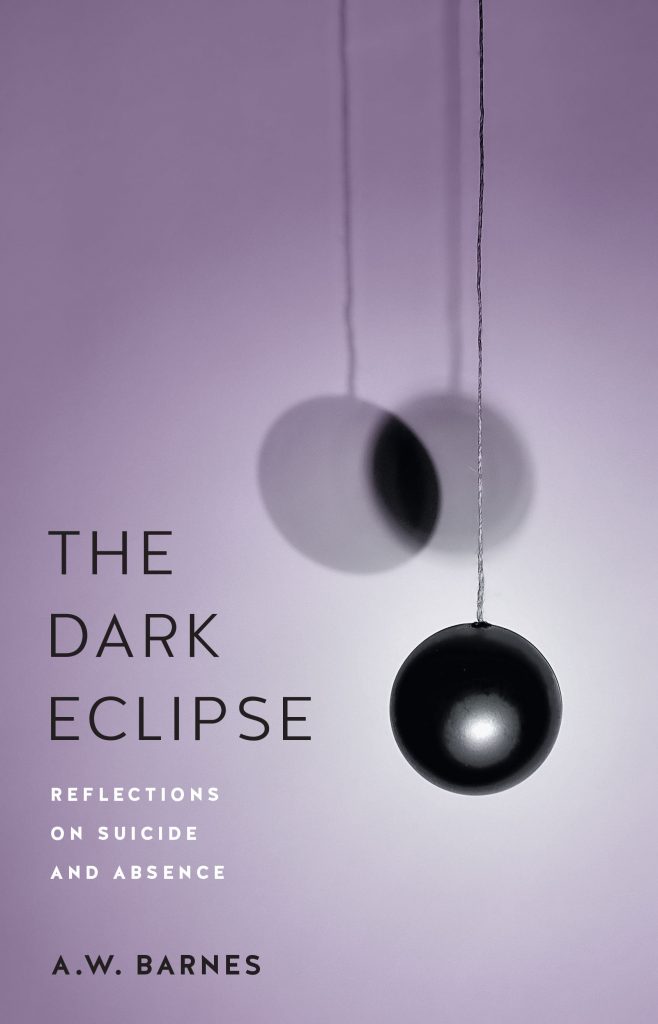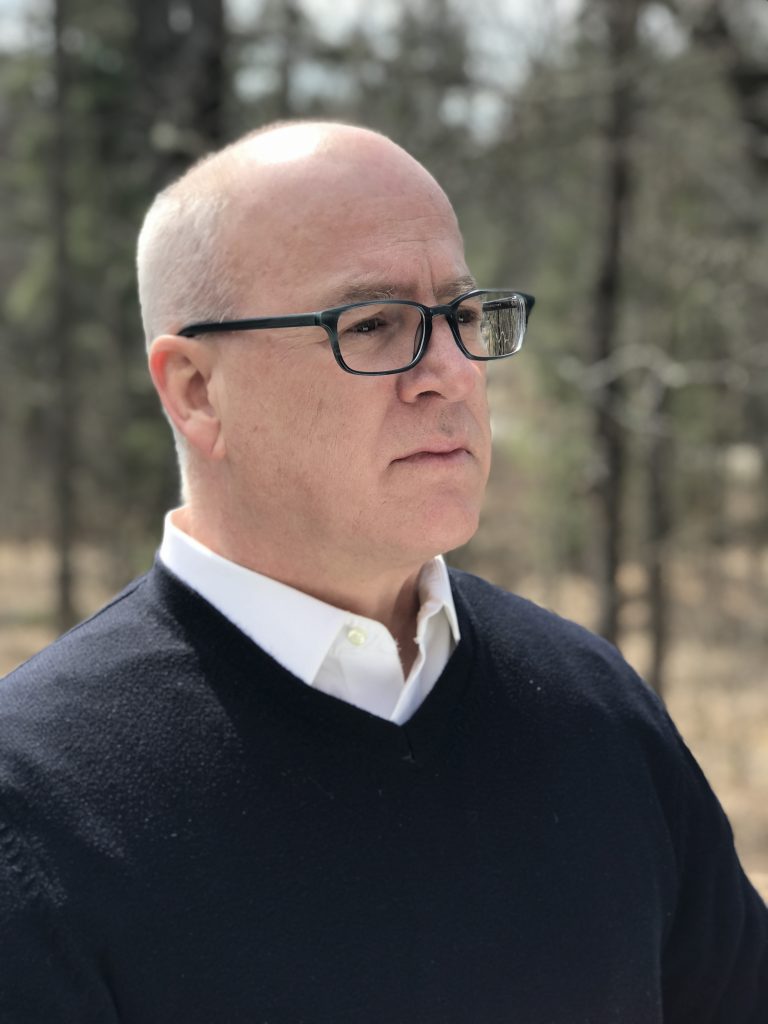
In honor of University Press Week 2019—the theme of which is “Read. Think. Act.”—we are speaking with Bucknell University Press authors whose work prompts us to think in ways that expand our perspectives, causes us to reflect, or prompts action. Today we’re featuring A. W. Barnes, author of the The Dark Eclipse, a collection of personal essays centering on the suicide of his older brother.
Barnes, a scholar of early modern literature and gender theory, makes use of source materials—police report, autopsy results, suicide note, and death certificate—to inform his own memories and understanding, and in so doing seeks to come to terms with his brother’s death and their complex relationship as gay siblings in a conservative Midwestern family.
Presidential Fellow Nate Freed posed the following questions to Barnes, who is also the author of Post-Closet Masculinities in Early Modern England (Bucknell University Press, 2009).
Freed: Writing The Dark Eclipse must have required a different approach from that of your last book, Post-Closet Masculinities, a traditional scholarly work. How did you find this transition from monograph to memoir-style essays? How did you conceive of these essays, and how did you think differently about style and audience while writing them?
Barnes: When I wrote Post-Closet Masculinities, I was interested in the historical construction of the concept of masculinity as a (seemingly) stable identity in western culture. My desire to write the book was born out of an intellectual curiosity from having read Shakespeare’s plays and the metaphysical poets like John Donne. But this intellectual desire was also informed by my personal experience of having grown up in a family of seven boys and one girl. My familial experience, that is, had intuitively taught me that there were unspoken rules about being masculine—rules to do with emotional output and behavioral codes—although as a kid these rules didn’t feel natural to me. In many ways I was the antithesis of the masculine ideal that reigned in my family. I don’t know if this feeling of not belonging in that hyper-masculine family came from being a gay kid—a sissy, really—growing up in a conservative Catholic, male-dominated family, or if having a creative personality in a family of practical business-minded people made me more sensitive to the brutal nature of masculinity. Either way, I’d always struggled with my place in such a family and so my intellectual pursuit in Post-Closet Masculinities was to satisfy that question of how one performs that kind of masculinity that I’d witnessed growing up, a performance that I wasn’t able to claim.
As a student in a doctoral program, I was taught that the personal or the emotional is suppressed in order to engage the intellectual, to prove, really, that the research you conduct is unbiased, which is an impossible thing to do. As scholars and intellectuals our desires obviously inform our pursuits although we are taught to hide those desires—at least this is the lesson I took from being a scholar and an intellectual.
While I was researching this book, I was hired as the Dean of the School of Liberal Arts and Sciences at Pratt Institute in Brooklyn, NY. As a liberal arts college embedded in an art and design institute, we were outsiders in every way, and thus as a school we were allowed—or we decided—to ignore the ways such divisions are supposed to behave in the academy. We made up our own rules. This freedom came from the art and design ethos that drove Pratt. This ethos also had a profound effect on how I saw myself as an academic. It allowed me to put aside that notion that a scholar must suppress the personal in order to highlight the intellectual.
In 2015, I decided to get my MFA in Creative Writing to help me with this transition. The research and the research methodologies I used to write The Dark Eclipse were informed by my doctoral training although the narrative arc of the book is informed by my MFA. I think that I achieved what I wanted to achieve; that is, to write a book whose emotional content comes first and whose intellectual premise comes second —the exact reverse of what I was taught to do as a scholar.
Freed: How did you find the craft of life writing? Was there any aspect of tackling this sort of writing that you found surprising, perhaps surprisingly difficult?
Barnes: While promoting this book, people consistently asked me if I had a hard time revealing such personal information and painful events. They also told me that I was brave for writing this book. I didn’t find it difficult nor did I consider myself brave, primarily because I have always been a person who needed to tell my story. I did find that writing about my brother Mike and his suicide was as painful as when I experienced the event itself over 25 years ago. The painful memories were just as sharp writing this book as they were back in 1993 when I traveled to New York to identify his body.
Freed: What has the response been that you’ve received? Was it what you expected and/or, perhaps, hoped?
Barnes: The response to this book has been great, and surprising. First, I realized that many people have had to experience the loss of a loved one through suicide, and that loss is often not discussed because suicide is still taboo. Many people thanked me for writing the book because it allowed them to deal with their own experiences with suicide.
I was also surprised that many people came up to me and told me their deepest secrets about loved ones who’d died, or about their own attempts at suicide. At first, I was taken aback by their frankness, but then I realized that they were entrusting me with secrets they hadn’t told anyone else because they felt a bond between us. Eventually, I realized that as a memoirist I had a responsibility to accept my readers’ responses even if they made me uncomfortable. That is, I felt an obligation to listen to their stories because they had invested their time and money in reading my stories.
Freed: You write detailed scenes with specific dialogue throughout The Dark Eclipse. How much of this dialogue was literally spoken, and how much is paraphrasing?
Barnes: This question is the question that memoirists have to tackle, and each of us has to answer it in our own ways. I know writers and teachers—some of my own teachers—who insist that dialogue in memoir must be completely accurate to the actual event. I know other writers and teachers—some of my teachers, as well—who believe that dialogue in memoir must be true to the emotional content of the scene, but without being made out of whole cloth. I align with this second group more than the first because memory necessarily plays with the accuracy of past events.
However, in The Dark Eclipse, there are dialogues that I am certain are completely accurate to the event, especially events that were imprinted so firmly in my hippocampus. For example, the scenes in the book at the morgue and at the lunch after my parents and I identified my brother’s body are 100% accurate. I can never forget those words. For other scenes in the book that contain dialogue, I relied on my memory of the event to capture the emotional essence of that event and used dialogue to relay that emotion as best as I could.
Freed: How did you decide the order in which to place the different essays in The Dark Eclipse?
Barnes: One aspect of the book that I like is that there is a narrative arc that is pretty straight-forward: my brother Mike committed suicide; I travelled to New York with my parents to identify his body; my parents claimed his body and buried it back in our home state, even though I was certain Mike wouldn’t have wanted that. Decades later, at the behest of a therapist, I decide to find out the facts of Mike’s death by looking at the documents that surround his death—the police report, the autopsy, Mike’s account of his illnesses, the death certificate—and other documents that informed my relationship with Mike—the coming out letter, the movie “Prospero’s Book” (which is its own kind of document), and Edith Wharton’s novel “The House of Mirth,” which helped me to understand Mike’s suicide when suicide—and certainly Mike’s suicide—seem impossible to understand. Thus the narrative arc follows the on two tracks: the suicide event from 1993, and my desire to uncover the facts of that event in 2015.
So, the structure of the book is determined firstly by the narrative arc, and secondly by a weaving together of the official and personal documents in the timeframe in which they were produced or in the order I encountered them.
Freed: The jacket copy states that “[You have] not been able to let [your brother Mike] go. This book is [your] attempt to do so.” Would you say that The Dark Eclipse was successful in allowing you to let Mike go?
Barnes: During the two months of radio interviews that I did for this book—interviews that can be heard on my website drawbarnes.com—interviewers consistently asked me this question. I’ve thought about this question a lot, and I think the best way to describe what happened to me in writing this book and putting it out in the world is that it allowed me to cordon Mike into a specific area of my brain, of my memory, where I allow him to live without interfering with my everyday life, which used to be the case. This was especially true when I went through difficult periods of my life and Mike was ever-present as a dangerous example of how I could end the suffering I was then going through. That is, he was a kind of seductive presence, a voice in my head that said I could simply commit suicide and thus end the pain I was going through, as I assume he decided to do. In writing this book, I’ve been able to relegate him and that suicidal voice to a specific area of my memory where it is allowed to live without influencing the way I life my life today.

Andrew W. Barnes is a writer living in New York. He was most recently Dean of the School of Liberal Arts and Sciences at Pratt Institute. He holds the PhD in English literature from SUNY-Stony Brook, an MFA in creative writing from Bennington College, and was a faculty member at William Paterson University for nine years.